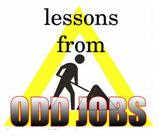You may enjoy a recent post at Mark's LeaderLog by Mark Sheffler, executive director of Leadership Akron, where he gives examples of his growth during the mentoring of six women leaders. Although he prefaces his remarks with this statement:
One risks becoming stereotypical in making general statements about what is unique among women leaders. I tend to think that all that I’ve learned from women colleagues/superiors I learned from dynamic individuals who happened to be women, rather than from women leaders per se. Research indicates that personality differences far outweigh gender differences when it comes to one’s leadership style.I think that there is plenty to be learned from watching and learning the various ways gender differences manifest in leaders. This is one of his observations:
I have also come to appreciate the “Relational Intelligence” of women leaders. The supreme importance of relationships among people and among organizations are critical to success in any enterprise.I met Mark several years ago at AMAkron Toastmasters. Toastmasters International is a communication and leadership organization. Most people think of it as where you learn to give speeches, but it is much more than that. It's where you learn to mentor, coach, evaluate to motivate and develop leadership practices that work.
What I have observed from the mentoring program in Toastmasters is this:
- Most people don't often characterise themselves as a mentor, but often want to help others.
- Those who have a mentor progress much much faster than those without a mentor.
- About 1/2 those who are mentored, become mentors themselves.
- The ones who are mentors become superstars -- in that they often mentor 3 to 5 others and become awesome speakers and even better evaluators.
- Men are often more direct with their suggestions than women are when they coach others. Women "don't want to hurt" some one's feelings, so they sometimes go very lightly over the coaching.
- On the flip side, sometimes men can be too pointed with their coaching, finding much more to criticize than points to encourage.
- Practice makes sone better. A beginning mentor is good. A seasoned mentor is better. Doesn't matter if it is a woman or a man, leadership - coaching - mentoring, all improve the more you do them.
Try to identify the mentoring and coaching skills you see in action. Is there are difference in the way women and men present their skills?


